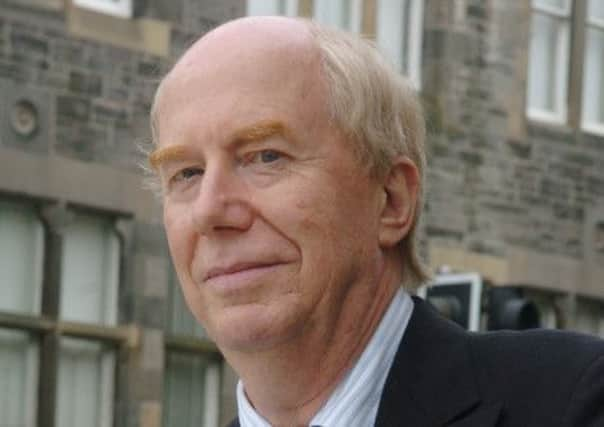Malcolm Chisholm: Yes camp ‘scaremongering’ on NHS


The big idea from the Yes Campaign in the first week of the short campaign was the big lie on the NHS. Those who have sanctimoniously criticised the No campaign for negativity showed that they are in a class of their own in the scaremongering stakes. The beauty of it from their point of view is that few people understand the complexities of health systems, Barnett consequentials and efficiency savings, with the Transatlantic Trade and Investment Partnership thrown in for good measure. So no doubt the scaremongering will go on but as a former Health Minister I have felt obliged to rebut it on a daily basis and shall continue to do so.
The first deception is that privatisation implies a withdrawal of public money. That is not the purpose of creating a Health Market.
Advertisement
Hide AdAdvertisement
Hide AdSome people believe that creating a market involving private as well as public providers will increase choice and improve quality. I have never been persuaded of this but that is the route they have been going down in England and the motivation and effect have nothing to do with saving public money. Indeed all the evidence is that the traditional NHS is the most efficient health system in the world and that the transaction and other costs of a market make for a more expensive system.
The Scottish Government and many others in the Yes campaign have been going around talking about massive cuts from privatisation but it is interesting that Alex Neil at two successive Question Times has only been able to mention one piece of evidence. The English Health and Social Care Bill had nothing about savings but the Impact Assessment on the bill, published in 2011, estimated efficiency savings of £1 billion a year from the changes.
There are three points to make about this.
Firstly, that is about 0.8 per cent of the health budget. Secondly, as I said at Question Time on Thursday 14 August , the Impact Assessment points out that the savings are “highly problematic.” Thirdly, efficiency savings are not the same as cuts, as the Scottish Government would be the first to point out since they impose efficiency savings of 3 per cent on every health board in Scotland every year.
None of this has stopped Alex Neil from saying two weeks in a row at Question Time that the £1 billion ‘cut’ to the English health budget would result in a £100 cut to the Scottish budget because Scotland receives roughly ten per cent of any changes to English Health budgets through Barnett consequentials. I don’t believe the notional efficiency savings will materialise at all because of the transaction and other costs of the market but, even if they did, they would not result in a cut to the budget any more than the 3 per cent efficiency savings imposed by the Scottish Government result in cuts to Health Board budgets. English health budgets have been increasing, albeit by not as much as previously, and the Barnett consequentials have meant that health budgets have gone up in Scotland too. There will of course be pressure on all budgets in the next few years, but not nearly as much as there would be in an independent Scotland, as I evidenced in the debate on Tuesday 12 August.
So the central piece of “evidence” from the Scottish Government is completely untrue but even if it was true, it would hardly lead to the biggest scare of the Yes campaign - that the Scottish NHS would have to be privatised in due course after a No vote.
This has to be not just the biggest lie of the Referendum campaign but the biggest political lie of all my years in politics.
There is no party in Scotland that wants to privatise the NHS and even the Tories are signed up to the health system that we have here in Scotland. The NHS is fully devolved and only the Scottish Parliament can decide the future of the NHS in Scotland.
This, however, is where some in the Yes campaign introduce another red herring, namely the Transatlantic Trade and Investment Partnership (TTIP). This agreement between the EU and the US would allow US health companies to compete for business where there is a health market such as in England.
Advertisement
Hide AdAdvertisement
Hide AdThe UK Government refuses to exempt health from this although Labour has pledged to do so if elected next year.
Either way however, none of this would affect Scotland where there is no market and no health contracts. This has been made clear by Garcia Becero, the EU Commissioner with responsibility for TTIP, who has said that health services in Europe will be opened to private competition but only where privatisation is already established.
I have however made one slight mistake in the last paragraph. I said there are no private health contracts in Scotland but, irony of ironies, public expenditure in Scotland on private health contracts has increased 23 per cent in the last year.
That’s more than three times the notional cut to the Scottish Health budget trumpeted by Alex Neil two weeks in a row.
None of this changes the fact that Scotland does not have, and I believe never will have, a privatised health system. So the next time you see that in a Yes leaflet , or hear it in the Parliament or on the doorstep, spot the lies but take comfort from the fact that they are in such trouble on the economy that lies are all they have left.
• Malcolm Chisholm is MSP for Edinburgh Northern and Leith, and was Health Minister between 2001 and 2004